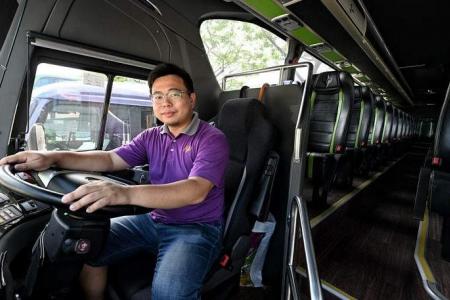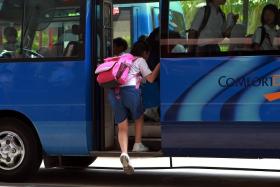School bus firm ends contract early after losing two drivers
In February, a bus operator that had served North Spring Primary School in Sengkang for more than 10 years informed the school that it was calling it quits.
What nudged K W Bus Service to throw in the towel was the loss of two of its 15 drivers – one was leaving for another industry, while the other, who was in his 70s, was retiring. The company is serving notice while the school looks for a new service provider.
K W’s owner, Mr Ho Jun Xian, 34, said his business has been operating constantly at the limits when it comes to manpower, and it has no resources to cover two fewer drivers.
Bus operators have found it increasingly difficult to recruit drivers in the past two years as the economy recovers post-Covid-19. Many are operating with no buffer.
Companies that provide school bus services have to compete for drivers who may be drawn to jobs that pay better, like ferrying tourists, or have more flexible hours, like doing last-mile delivery services.
North Spring Primary called a tender for a new school bus operator, which closed on March 31. Based on tender documents, the new contract for North Spring Primary will start on May 27, which is the first day of the school holidays following the end of the first semester.
The Straits Times has contacted the school for comment.
Mr Ho, who started working as a bus driver for his father when he was 23, said the company has 18 buses. Both his parents, who are in their mid-60s, also work as drivers to cover the school bus routes daily.
The company has other transport jobs to keep the fleet busy.
Mr Ho’s daily routine includes picking up the first pupil to go to North Spring Primary at 6am, as well as pupils from CHIJ Our Lady of the Nativity in Hougang after school is dismissed in the afternoon.
He said he deals with operation emergencies fairly frequently. On the morning before he met ST, one of his older drivers was hospitalised in the wee hours for a heart condition. Mr Ho himself had to drive a second trip to pick up the pupils affected.
Given the lack of bus drivers, some schools allow bus operators to make more than one trip to ferry the pupils. This means that some pupils are picked up earlier to get to school or reach home later after dismissal.
Mr Ho, who is married with two young children, also recounted an instance recently when he found out at 5am that one of his drivers could not work that day because his child was sick. Mr Ho’s solution then was to have the affected pupils make their own way to school via taxis and to reimburse them for the fare.
The implementation of the Progressive Wage Model for drivers from March 1, 2023, has been another source of pressure for operators. Mr Ho said: “Of course, I would like to pay my drivers more, but contracts which were set years ago are paying us the same amount as before.”
School bus service contracts are typically set for two to three years, with the option to extend. While bus fares have been increasing, most operators say that the hikes are not sufficient to match the rising costs of running the business.
An industry insider explained that Ministry of Education school bus contracts are often not the most profitable type of work, but they can make commercial sense if the operator is able to integrate the school routes with other types of work. For example, after dropping off the primary school pupils, the bus can move on to pick up international school students, or maybe workers.
Mr Ho said drivers can also be picky. Some, for example, prefer to drive smaller buses even if the pay is lower because the vehicles are easier to manage. But larger buses with more seating capacity tend to be more cost-efficient for the operator.
K W was dealt a further blow in March when one of the four subcontractors that the company uses for its contract with CHIJ decided to pull out.
Subcontractors are not directly engaged by the schools. The company holding the contract assigns routes to these bus operators and liaises with the school and parents.
Mr Ho said that when other industries shut down during the earlier part of the Covid-19 pandemic, bus operators who specialised in worker transport or ferrying tourists switched to providing school bus services.
With the end of the pandemic, many are turning away from doing school runs, which makes it harder for school bus operators to find subcontractors.
Mr Ho said his priority now is to ensure that the bus operation at CHIJ runs smoothly in the new semester, before he looks for other types of work to keep the fleet and drivers busy.
Get The New Paper on your phone with the free TNP app. Download from the Apple App Store or Google Play Store now


